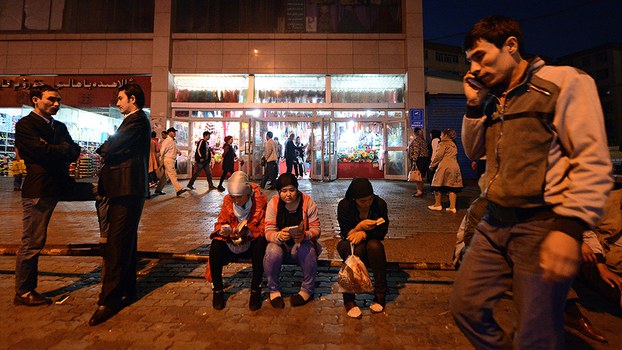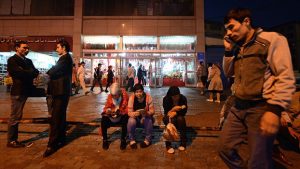Xinjiang Authorities Subsidize Uyghurs to Relocate to Han Districts of Urumqi

Radio Free Asia, 25 August 2017
 By Eset Sulaiman and Kurban Niyaz – Authorities in the capital of northwest China’s Xinjiang region are offering Uyghur residents large subsidies to relocate from districts dominated by their ethnic group to those largely inhabited by majority Han Chinese as part of a new policy aimed at “promoting unity,” according to official sources.
By Eset Sulaiman and Kurban Niyaz – Authorities in the capital of northwest China’s Xinjiang region are offering Uyghur residents large subsidies to relocate from districts dominated by their ethnic group to those largely inhabited by majority Han Chinese as part of a new policy aimed at “promoting unity,” according to official sources.
Urumqi has become increasingly segregated amid tensions between Uyghur and Han residents in the aftermath of ethnic violence in the capital in July 2009 that, according to state media, left some 200 dead, although Uyghur groups in exile put the number much higher.
As part of a bid to promote ethnic “friendship” and stability following his appointment in August 2016, Xinjiang party chief Chen Quanguo initiated a new “become relatives” policy in October which aimed to assign a Han Chinese “relative” to each Uyghur household who would monitor the family’s adherence to Chinese rule and report its activities to the authorities.
According to an announcement recently obtained by RFA’s Uyghur Service, Chen expanded on the “become relatives” policy on July 7 with an “Integrated Residency” promotion that encourages residents of Urumqi’s traditionally Uyghur districts of Tengritagh (in Chinese, Tianshan) and Saybagh (Shayibake) to move to four Han-dominated districts in return for residential subsidies.
Residents from the two districts deemed “eligible” may receive between 50,000 yuan (U.S. $7,515) and 80,000 yuan (U.S. $12,025) towards purchasing homes in the neighborhoods of Bulaktagh (Shuimogou), Jingkai, Midong, and Gaoxin, depending on whether the apartments are located in buildings up to seven floors or eight floors and above.
Han Chinese buyers are entitled to the same subsidies for purchasing homes in the Tengritagh and Saybagh districts.
If the purchase is made within 90 days of the announcement, 60 percent of the subsidy will be paid in the first year and 10 percent paid in each of the following four years. For purchases made after the 90-day period, 40 percent of the subsidy will be paid in the first year and the remainder paid out over the following four years.
Aid is also available for the purchase of a land ownership certificate for “eligible buyers” who have purchased an apartment, the announcement said, based on the square meterage of the unit.
The local government will pay up to 20 percent of utility and heating costs for 10 years after the purchase of the unit, also based on the footprint of the unit, it said.
Additionally, the government will assist family members of the buyer to become registered for social services within Urumqi if they are moving from outside of the city, train the buyer for new employment opportunities, and provide “educational conveniences” for the buyer’s children—including helping them attend better schools and adding five points to their middle school graduation exam scores.
Those who receive subsidies for purchasing their apartment in the four districts “cannot resell the apartment until they have lived there for 10 years and then can only sell it to a buyer from the same ethnic group as the owner,” the announcement adds.
A Uyghur staff member with the Integrated Residency Project Leadership Group of the Saybagh district government confirmed the terms of the announcement and said the promotion was aimed at preventing members of ethnic communities from residing together in groups in the city.
“As you know, the Tengritagh and Saybagh districts are Uyghur-dominant areas, so a Uyghur who purchases an apartment in the four Han Chinese-dominant districts will benefit from the policy,” she said.
“In this way, Uyghurs from these two districts can be scattered into those Han Chinese districts … If the Han Chinese want to receive benefits they must purchase apartments in the Tengritagh and Saybagh districts. In this way, various ethnic groups can mutually understand each other, learn each other’s language and create a harmonious and united atmosphere.”
The staff member said that in order to avoid possible conflicts that could arise after the launch of the Integrated Residency project, government employees had already begun propaganda work by visiting homes to explain the relevant policies, laws and regulations to residents.
“We’re introducing Uyghur customs to the Han Chinese, while presenting Han Chinese traditions to the Uyghurs,” she said.
Eligible applicants must not have committed any crimes, as verified by residency committee and local police stations, she added.
A Uyghur staff member with the Integrated Residency Project Leadership Group of the Bulaktagh district government told RFA that in order to receive the subsidy, a buyer must purchase an apartment in a designated district and “his neighbor must not be from his own ethnic group.”
“If inhabitants of certain building become dominantly Uyghur, then we’ll disperse those Uyghurs to other buildings, because gathering certain ethnic groups into the same building goes against the policy,” she said.
“The reason why we started in the Tengritagh and Saybagh districts is that the majority of the population is Uyghur and the Han Chinese don’t want to buy apartments there. Amid this kind of ethnic segregation, we decided to encourage them to reside together … the government’s aim is to balance the residential rate of various ethnic groups.”
According to the staff member, the majority of applicants for the subsidy program so far have been Uyghur.
“The majority of Uyghurs live in poorer economic conditions, compared to Han Chinese, so the government aid is attracting lots of them through this project,” she said.
Emigration incentives
A Han Chinese official with the Residency Committee of Urumqi’s Nanmen district told RFA that the Integrated Residency project also made it easy for Hans from outside of Xinjiang to move their household registration to the region—a process that is often extremely difficult for Uyghurs looking to move to other parts of China.
“The new household registration is very convenient for emigrants from China proper because the government is making a great effort to encourage Han Chinese to move to Xinjiang,” he said.
He also praised Han Chinese who had been assigned as “relatives” of the area Uyghurs, as well as married couples comprised of Hans from outside of Xinjiang and local Uyghurs, who he said are helping to contribute to the stability of the region.
“Xinjiang is now enjoying ‘ethnic unity’ and the ‘become relatives’ policy,” he said.
“I have personally become the ‘relative’ of a Uyghur and we do many things together, such as playing, eating and killing time. It’s widely accepted now that Han Chinese must have a Uyghur relative and vice versa.”
Ilshat Hassan, president of the Washington-based Uyghur American Association, said the subsidy program is Chen’s latest measure aimed at assimilating Uyghurs, who complain of pervasive ethnic discrimination, religious repression, and cultural suppression under Chinese rule in the region.
“The Chinese government is telling Uyghurs that if they love the government and the Han Chinese people, then they will receive many things, including such benefits,” Hassan said.
“It’s also Chinese policy to relocate Uyghurs from Uyghur-dominant areas to Han Chinese-dominant districts in order to integrate them into the ‘Chinese family,’ but the Uyghurs will never accept this,” he said.
“The final goal of such an integration policy is to completely assimilate the Uyghurs by encouraging their intermarriage with Han Chinese, and wipe them out from this resource rich region.”
In its 2016 Country Reports on Human Rights Practices, the U.S. State Department said that Beijing’s policy of encouraging Han Chinese migration into minority areas had “significantly increased the population of Han in the [Xinjiang region].
“In recent decades, the Chinese-Uighur ratio in the capital of Urumqi reversed from 20/80 to approximately 80/20 and continued to be a source of Uighur resentment,” the report said, adding that “discriminatory hiring practices gave preference to Han Chinese and reduced job prospects for ethnic minorities.”
Reported by Eset Sulaiman and Kurban Niyaz for RFA’s Uyghur service. Translated by Kurban Niyaz.
http://www.rfa.org/english/news/uyghur/subsidies-08252017150606.html

